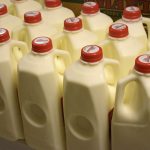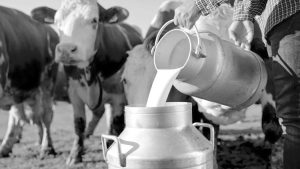
Connecticut’s dairy farmers are putting out a call for help as milk prices plummet.
The industry’s biggest buyers include schools, restaurants, and coffee shops, all of which are closed or have greatly scaled back service in response to the coronavirus pandemic.
“Some milk is being dumped in Connecticut because there’s no room for processing,” said Don Tuller, president of the Connecticut Farm Bureau.
At Oakridge Dairy in Ellington, owner Seth Bahler is reducing production by 15-percent, which means it is producing about one million fewer pounds of milk each month.
“Dairies cannot just shut a switch off and stop producing milk. Cows produce milk every single day,” Bahler said.
Bahler said the year started out well for dairy farmers, with milk prices around $17 per hundredweight. But the price keeps dropping. It’s currently $13.76 per hundredweight and is projected to drop to $10.45 per hundredweight in May.
If the numbers stay on track, farmers like Bahler are looking at a nearly 40-percent drop since January.
“We’re talking $500,000 to $600,000 less per month of income,” he said.
Bahler has about 50 employees on the payroll and 3,000 cows to feed and care for.
The Connecticut Farm Bureau estimates farms need about $2 million a month to stay afloat.
“We’re concerned that we might lose half of the dairy farms in the state if we don’t get some help,” Tuller said.
The USDA announced a $19 billion relief program that will provide up to $125,000 for farmers and ranchers.
Bahler said that is a “drop in the bucket” for farms. He and Fuller are hoping the state will step in.
At his daily news briefing on Friday, Governor Ned Lamont pledged to help.
“We’re coming up with strategies now to be able to compensate them,” the governor said.
The Connecticut Department of Agriculture said it is in regular contact with the Connecticut Farm Bureau.
“This is what we’re trying to understand, is what is the total economic impact and how do we aggregate it?” said Commissioner Bryan Hurlburt.
But this problem is not unique to Connecticut. Dairy farms across the country are struggling.
“Because it’s on a national scale it’s really imperative that the USDA develop a federal program that can support America’s dairy farmers,” Hurlburt said.
Hurlburt said he’s pleased to see farms included in the $484 billion coronavirus relief package approved in Congress on Thursday after they were cut out from the previous bill.
“Farms are small businesses,” Hurlburt said.
The new bill will allow farmers to apply for Economic Disaster Injury Loans (EIDL) through the Small Business Administration, as well as assistance through the Paycheck Protection Program.
Hurlburt said the state also established an Ag Sustainability Account about a decade ago to offset the higher cost of production in Connecticut. The state recently expedited one of those payments and the next one should be going out in a few weeks.
“That should buy us a little bit of time to catch our breath and make sure that the way we respond at the state level in conjunction with what’s happening at the federal level is what’s best for not just the dairy farmers of the state but all farmers of the state,” Hurlburt said.
The commissioner said he’s been impressed by how quickly farmers have adapted to create curbside pickup and delivery services.
At Oakridge Dairy, Bahler said business for his home delivery service has jumped.
He said consumers can help farms by buying local.
To that end, the Department of Agriculture created the CT Grown map of farms, farmers’ markets, and farm stands in Connecticut, along with hours of operation, products they carry, and whether they accept SNAP or EBT.
























